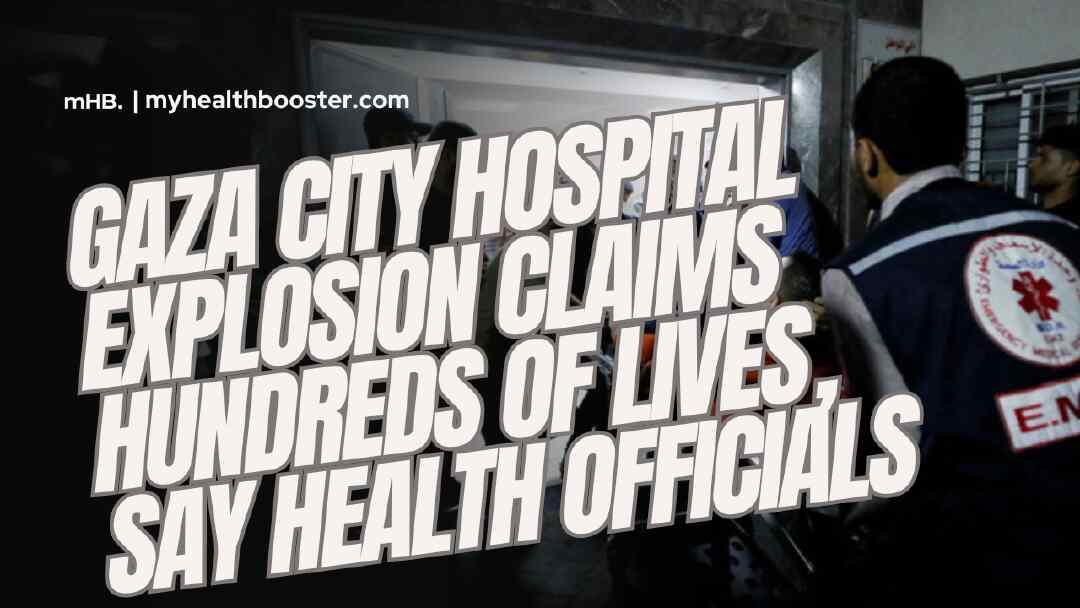Health authorities report that a massive explosion at a crowded hospital in Gaza City has resulted in the loss of hundreds of lives.
One medical professional decried the incident as a “massacre” at Al-Ahli Arab Hospital, while another described a scene of utter devastation.
According to Palestinian officials, the explosion was caused by an Israeli airstrike. However, the Israeli military asserts that it was the consequence of a failed rocket launch by the Palestinian Islamic Jihad, an accusation that the militant group vehemently denies.
In response to a significant attack by the main Palestinian militant group, Hamas, which claimed the lives of 1,400 people on October 7, Israeli warplanes and artillery have been relentlessly targeting Gaza.
The hospital blast now jeopardizes efforts to address the ongoing humanitarian crisis in the region, leading Jordan to cancel a scheduled summit between US President Joe Biden, King Abdullah, and Palestinian and Egyptian leaders.
Despite these circumstances, President Biden will proceed to Tel Aviv to demonstrate his nation’s “solidarity with Israel” and “unwavering commitment to its security.”
Images emerging from Al-Ahli Arab Hospital on Tuesday night portray scenes of chaos, with wounded individuals being rapidly evacuated on stretchers in the dark. Bodies and damaged vehicles are strewn across the debris-laden streets outside.
One video seemingly captures a projectile impacting the area, followed by a powerful explosion.
Dr. Ghassan Abu-Sittah, a plastic surgeon from Médecins Sans Frontières who had been aiding the injured, expressed, “We were working in the hospital when a powerful explosion occurred, causing the ceiling to collapse. This is nothing short of a massacre.”
Another physician informed that 80% of the hospital’s capacity was rendered inoperative, estimating that around 1,000 people had been either killed or injured.
The Ahli al-Arab Hospital is entirely funded by the Anglican Church, which asserts its independence from any political factions in Gaza.
Canon Richard Sewell, the Dean of St. George’s College in Jerusalem and a prominent figure within the Church, acknowledged the difficulty in obtaining precise information but confirmed that the hospital had indeed been impacted, resulting in a staggering loss of life.
He revealed that approximately 6,000 displaced individuals had sought shelter in the hospital’s courtyard at the end of the previous week.
The hospital initially suffered damage and left four individuals injured as a result of an Israeli airstrike on Saturday. Subsequently, around 5,000 individuals evacuated the courtyard, leaving approximately 1,000 remaining, many of whom were elderly or infirm and required assistance.
Reverend Sewell disclosed that about 600 patients and the staff attending to them were inside the hospital at the time of Monday’s explosion, but he believed that most of the casualties were located outside.
He emphatically asserted, “There is no justification for this type of attack, whether accidental or deliberate. It is an absolute tragedy unfolding before our eyes.”
Zaher Kuhail, a British-Palestinian civil engineering consultant and university professor who was in close proximity to the incident, provided a harrowing account. He witnessed “two rockets coming from an F-16 or an F-35 fighter jet, ruthlessly shelling these people without any mercy.”
Kuhail added that many individuals perished in fires ignited by the explosion, and that first responders were ill-equipped to rescue survivors.
Gaza’s health ministry reported 500 fatalities and raised concerns about hundreds more potentially trapped beneath the rubble.
Hamas attributed the incident to an Israeli airstrike, which it characterized as a “horrific massacre.”
A spokesperson for Palestinian Authority President Mahmoud Abbas, who operates from the occupied West Bank, accused Israel of committing a “heinous crime.”
Anger spilled onto the streets in the West Bank, as hundreds of demonstrators clashed with Palestinian Authority security forces, leading to the use of tear gas in response.
The Israel Defense Forces (IDF) initially emphasized that hospitals were not the target of their attacks and urged caution regarding “unverified claims.”
However, Rear Admiral Daniel Hagari, the IDF’s chief spokesperson, later stated in a video message, “After a comprehensive review and cross-examination of our operational and intelligence systems, it is evident that the IDF did not strike the hospital in Gaza.”
He clarified that the hospital had been hit due to a failed rocket launch by the Islamic Jihad terrorist organization, asserting that 450 out of the numerous rockets indiscriminately launched toward Israel during the conflict had fallen within Gaza, endangering its civilians.
The Palestinian Islamic Jihad vehemently denied any involvement, asserting that it had not conducted any activities in the vicinity of Gaza City at the time.
The International Committee of the Red Cross expressed shock and horror over the reports, emphasizing that hospitals must be sanctuaries for preserving human life, not scenes of death and destruction.
The World Health Organization called for the immediate protection of civilians and healthcare facilities, urging the Israeli military to reconsider the evacuation orders issued for 20 hospitals in northern Gaza in anticipation of a major ground offensive.
The organization underscored the practical challenges in carrying out such evacuations, given the prevailing insecurity, the critical condition of numerous patients, and the shortage of ambulances, medical staff, available beds, and alternative shelter for displaced individuals.
